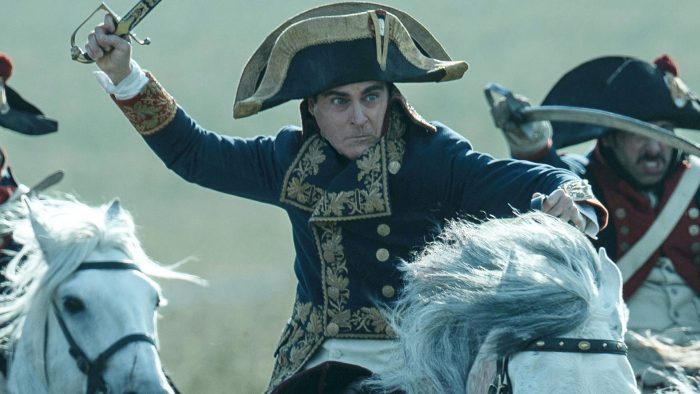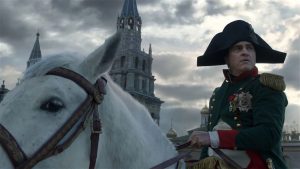Ridley Scott’s ‘Napoleon’ is mostly style and little substance

Reviewed by Jeffrey Sanzel
Director Ridley Scott’s career spans over four decades. His earliest films include Alien (1979), Blade Runner (1982), Legend (1985), and Thelma and Louise (1991). Gladiator (2000) garnered twelve Oscar nominations, winning five, including Best Picture. Scott received three nominations for Best Director: Thelma and Louise, Gladiator, and Black Hawk Down (2001). Additional nominations include three British Academy Film Awards (BAFTA), four Golden Globe Awards for Best Director, and two Primetime Emmy Awards. So … shame on you, Mr. Scott.
His latest contribution to the world of overstuffed, overlong, and overdone cinema is the one-hundred-and-fifty-seven-minute Napoleon, a biopic of staggering boredom. Passionless and plodding, the film’s sole strengths are in its excellent visuals, with brutal (albeit seemingly repetitive) battles.

A great deal has already surfaced about the film’s historical inaccuracies: Napoleon was not present at the execution of Marie Antoinette; he did not order his troupes to fire on the Pyramids of Giza; he never charged into battle; he never came face-to-face with the Duke of Wellington; there was no giant frozen lake at Austerlitz. But a film does not have to be a history lesson.
Apocrypha—and even invention—can be forgivable in the name of art, insight, or entertainment. The latter cavils are two of the better moments in Napoleon. The Austerlitz confrontation is powerful but has also been seen in the film’s trailers, spoiling the most dramatic sequence. Napoleon’s meeting with Wellington aboard the HMS Bellerophon contains one of the few moments of dramatic subtext. But a handful of moments do not rescue this Waterloo.
Napoleon opens in 1793, at the height of the Reign of Terror during France’s French Revolution, and ends in 1821, with Napoleon exiled on the island of Saint Helena. Absent of pacing, the story’s twenty-eight years feel like they are playing in real-time. Scott announced he has a four-and-a-half hour cut. (Enough said.)

Joaquin Phoenix plays Napoleon like a ventriloquist, his lips barely moving, his eyes vacant (somehow reminiscent of Jennifer Jason Leigh in Single White Female.) Occasionally, he throws an ineffectual temper tantrum to show the emperor’s immaturity—more man-child Stanley Kowalski than a legendary conqueror. When he discovers Joséphine’s infidelity, he whines like a frustrated teenager.
If this choice is to show his humanity, it is odd: Phoenix is distinctly modern, surrounded by a company playing some semblance of period style. Ultimately, Phoenix never loses himself in the character, and the audience remains aware of the actor making methodical choices for the sake of effect rather than motivation. (He also seems to live in his bicorne hat.) Vanessa Kirby’s Joséphine de Beauharnais is not without interest. She conveys thought and depth but feels distinctly unfinished. Her mercurial shifts seemed manufactured rather than rooted in emotional struggle. The fault lies in the script and direction, not the actors’ work.
The rest of the cast barely registers. The many cabinet members and historical denizens are interchangeable figures in costumes and wigs—albeit exceptional. Even the great Rupert Everett’s Wellington struggles to find individuality. The French street rabble wave and pump their fists like an overly eager community theatre production of Les Misérables. Oddly, the horrific deaths of the horses in battle convey stronger horror than the murder of the thousands of soldiers.

The battles are impressive, epically staged with hundreds of extras. But they seem almost generic. The military conflicts alternate with scenes of pomp and pageantry—balls and meals and a remarkable coronation, all gloriously and beautifully designed and executed. These contrast with scenes of domestic stagnation with Napoleon and Josephine sitting next to each other, staring blankly as if locked into a period spoof of Scenes from a Marriage. Whether it is the actors or the characters, the relationship lacks spark. The sexual encounters are painfully, unintentionally comic. (Or one would hope unintentionally.) Scott’s refusal to find a tonal center results in stretches that seem like a violent episode of Blackadder.
In the end, Napoleon is mostly style and little substance. Oppenheimer made science and math riveting. Napoleon makes extraordinary political intrigue banal. With a story of power struggles, revolution, betrayals, and world-shattering choices—including the death of millions, the result is strangely hollow. With clunky dialogue and lacking a true core, Napoleon tries—and fails—to clothe this emperor.
Rated R, the film is now playing in local theaters.






